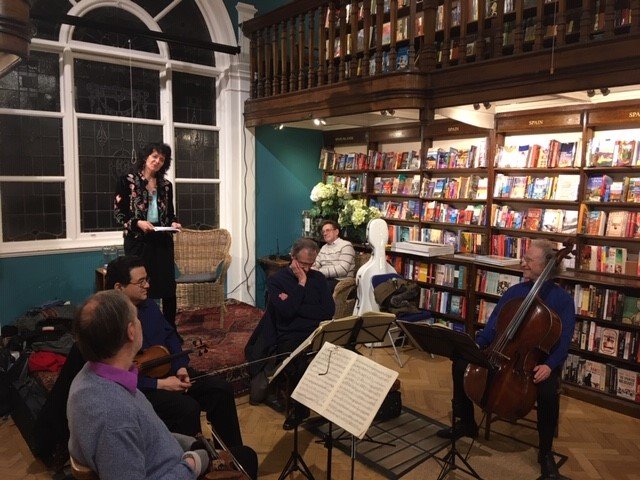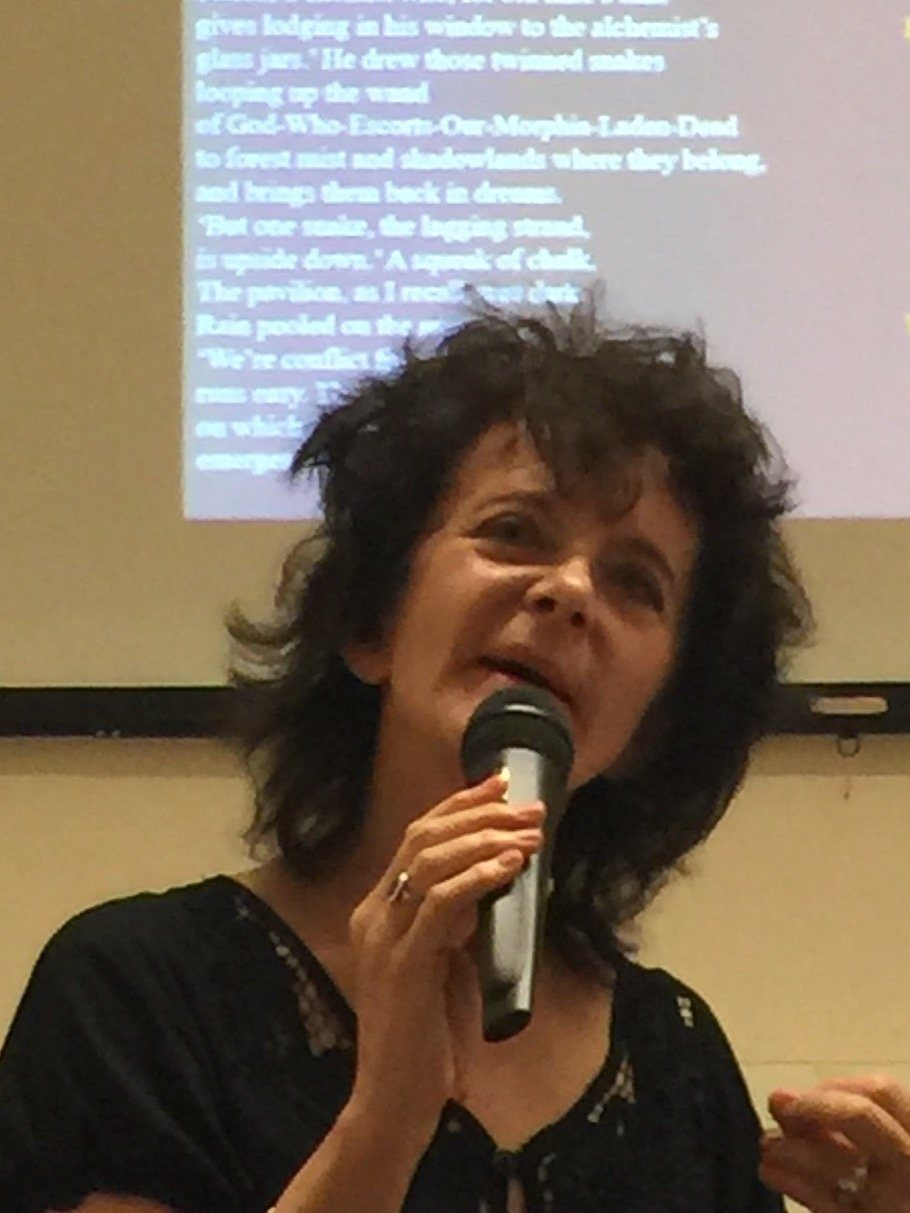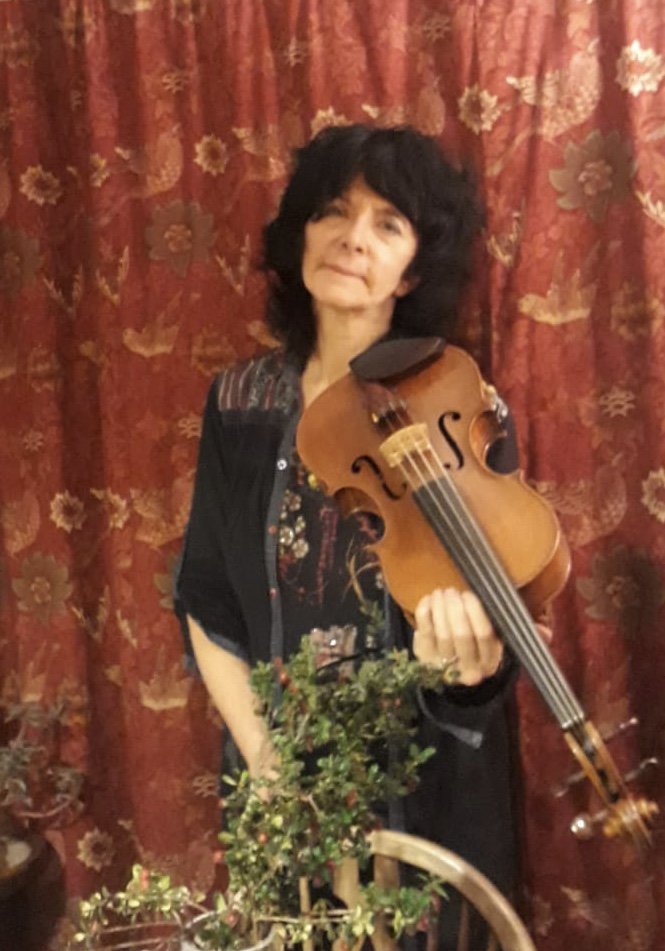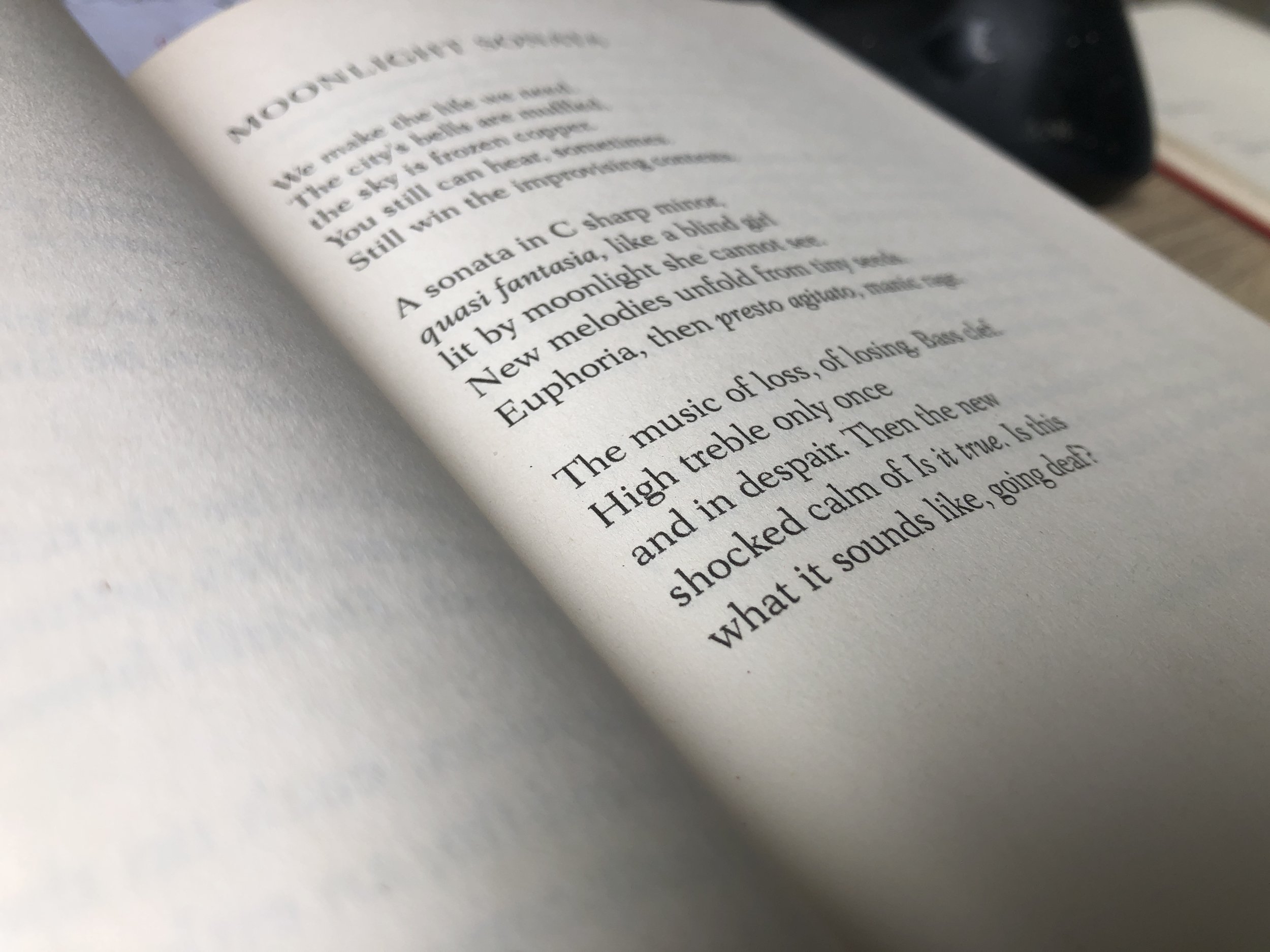Music
As for most people, music is a vital part of my life. Mostly classical – I’ve always sung in choirs and singing groups, have played the viola from childhood, and have talked on radio about music in various ways – presenting a programme of Radio 3’s The Choir, in which I asked, What is the voice of a choir? Who are they supposed to be as they sing? I also wrote and presented a series on Elgar, have talked about Playing the Viola, have talked for Front Row on Beethoven; and for In Tune. on Scheherazade with the City of London Sinfonia. I began my biographical collection of poems on Beethoven with a poem about how my parents met, playing music.
My choices on Michael Berkeley’s Private Passions, 1998, and Desert Island Discs, 2009, roved around opera and chamber music, but also folksong, Muddy Waters, Cretan songs, and Melina Merkouri singing The Boys from Peiraeus.
I did once confess that in another life I’d love to have been an opera director, and I wish I’d learnt the oud as a child. I also wish I’d learned to improvise, on any instrument. But I am taking raga lessons, so maybe that’s a start. Music is a journey for everyone and I feel I’m just beginning.
With the Endellion Quartet, rehearsing Beethoven, March 2020
Musical collaborations
String Quartets
In 2013, Ruth was commissioned by Tring Chamber Music to write and perform a sequence of crucifixion poems to accompany Haydn’s string quartet Opus 51, Seven Last Words from the Cross.
These poems became the centre-piece of her T S Eliot Prize shortlisted poetry collection on harmony and the Middle East, Learning to Make an Oud in Nazareth.
‘The magnificent central section about the crucifixion is an imaginative feat,’ said the Observer. ‘Wonderful, audacious, minutely crafted. Her command of register is masterly, moving from formal to conversational with graceful authority. Padel is a poetic Daniel Barenboim, determined to find common ground and arrive at some approximation of Middle Eastern harmony. The collection includes more than one poem describing a musical instrument, including the oud. The opening poem goes into sensual detail about the making of the instrument and is itself a mini-creation story.’
Ruth went on to perform these poems with the Endellion Quartet, at the Aspect Foundation and elsewhere. From 2015 she has worked with the Endellion Quartet in concerts combining her poems with music by Beethoven, Schubert and Tchaikovsky. This was the foundation of her 2020 collection, Beethoven Variations.
Read here her London Review Bookshop and how she came to write the book.
Listen here to a podcast of her event at the bookshop, Beethoven, the Poets’ Take, with Anthony Anaxagorou and Raymond Antrobus.
Opera
In 2014, Ruth was first Writer in Residence at Covent Garden. She attended rehearsals of a ‘Faustian package,’ a revival of Gounod’s Faust alongside two new operas on the Faust theme, and blogged about the behind-scenes process, from rehearsal to performance. She has also given pre-concert talks at Glyndebourne and presented a series of interval talks on Radio 3 called Close Encounters, in which she analysed each opera by focussing on one scene – such as ways in which Verdi flouted 19th-century convention in La Traviata, the war of the sexes in Cosi Fan Tutte, relations between ‘abandoned’ woman Ariadne and Bacchus, god of wine, in Strauss’s Ariadne auf Naxos – and sang an aria from the scene herself.
Music and Science
From 2010 to 2014, Ruth collaborated with composer Michael Zev Gordon on two musical-cum-scientific projects funded by the Wellcome Trust. Their first project was Music from the Genome, an arts and science project aimed at discovering, and reflecting upon, musical aspects of genes. Each member of a forty-strong choir sang their own genetic code to a text by Ruth, which Ruth and Michael titled Allele.
Allele premiered in 2010 at Diamond Light, the UK National Synchrotron Facility, which won Michael Zev Gordon the 2011 BASCA Composer of the Year award (choral section). Ruth wrote about the complexities of this collaboration for the Wellcome Trust’s website on the project.
Ruth’s second collaboration with Michael Zev Gordon was a project called Awake, which incorporated patients’ reports of waking under general anaesthesia. To begin their research, Ruth and Michael were put into scrubs to visit the Anaesthesia Unit at St Thomas’s Hospital for a day, observing patients anaesthetized for operations from hand surgery to heart surgery, and talked to patients in recovery. They found that Ruth could not bear watching knives cutting into flesh, and Michael could not bear watching injections. Michael then planned a cantata – and the text Ruth wrote for it was called Into the Dark, first performed in 2015 by soprano Clare McCaldin at the Royal Society of Medicine.
My first quartet concert. I’m nervous as a foal.
I know nothing about Beethoven, have no idea
his first quartet is such a deal for him…
(‘To Be Played with the Utmost Delicacy’, from Beethoven Variations)
Ruth with her viola
Ruth’s history with music
Ruth’s parents met at Music Camp in Bothampstead, directed by Bernard Robinson. Her father played cello, her mother clarinet, and Ruth grew up playing viola in family string quartets. The first fee she ever earned was £5 playing viola in Westminster Abbey.
The professional musicians in her family were on her father’s side. Her father’s grandfather Christian Gottlieb Padel was a piano soloist, born in Christiansfeld, south Denmark, who studied at the Leipzig Conservatoire with Carl Reinecke, Moritz Hauptmann and Beethoven’s pupil Ignaz Moscheles. In 1868 he settled in York, teaching – one of his pupils was the composer George Butterworth – and playing concertos with the York Symphony Orchestra. His son, Ruth’s grandfather Charles Frederick Christian Padel, born in York, played the violin and as headmaster of Carlisle Grammar School established a vigorous school orchestra and a family string quartet, a tradition that continues through the family.
But wherever she has lived, Ruth has also sought out singing, whether this meant learning Cretan mantinades from workmen in the archaeological trenches at Knossos, or in more formal settings. She has sung in the Schola Cantorum of Oxford, Philippe Caillard’s choir in Paris, the choir of St Eustache in Les Halles, the Heraklion Town Choir in Crete and – for a couple of evenings, unpaid – in an Istanbul nightclub. She currently sings in a madrigal group.
A poem from Ruth’s Beethoven Variations
Working on a radio script
Writing, Teaching, Broadcasting
Ruth has written, lectured and mentored on music throughout her life. Her 2020 collection Beethoven Variations – Poems on a Life weaves autobiographical fragments of her own music-making into the life and music of Beethoven. Her 2014 T. S. Eliot-shortlisted poetry collection Learning to Make an Oud in Nazareth turns on the idea of harmony. It begins by turning an account from an 8th century Arabic treatise, on how to make an oud, into a love poem and creation myth. Its centrepiece is a series of poems on the crucifixion, exploring Christ’s Seven Last Words. It began as poems which she read between movements in a performance of Haydn’s String Quartet Opus 51. She describes working on this here.
I’m A Man: Sex, Gods & Rock ‘n’ Roll (2000) combines her love of opera with rock music and Greek myth. For The London Review of Books. For London Review of Books, she has written essays on women’s voices in opera and a sixteenth-century madrigal. She has taught a ‘Women in Opera’ course in the Modern Greek Department at Princeton University, mentored poets writing words for choral music on a 2012 programme Writing for Voices in Oxford, given pre-performance talks at Glyndebourne Festival Opera, and chaired a session Listening to the 20th Century with Alex Ross, music critic of The New Yorker, at Jaipur Literature Festival 2017.
On BBC Radio 4, among her series on artists and writers was a 5-series on Edward Elgar, The Enigma I will Not Explain. On Radio 3, Ruth has presented an episode of The Choir, a radio essay on playing the viola, and a series of interval talks on opera, Close Encounters, in which she sang the soprano examples.
Credit: Kalpesh Lathigra





